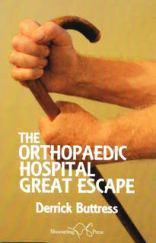Peter Ulric Kennedy critiques Derrick Buttress’ idiosyncratic poems
 The Orthopaedic Hospital Great Escape
Derrick Buttress
Shoestring Press
ISBN 978-1-910323-64-9
32 pp £ 7.50
The Orthopaedic Hospital Great Escape
Derrick Buttress
Shoestring Press
ISBN 978-1-910323-64-9
32 pp £ 7.50
This is a handsome looking collection, and the title poem ‘The Orthopaedic Hospital Great Escape’, succeeds, in its metre, plot and surreal humour:
At midnight we began the voyage,
our flotilla of hospital beds
gliding in a squeaking line
through the narrow channel
of Portland children’s ward …
This opening immediately gives us a sense of place and of a voyage; the swing and rhythm of the lines contributing to the feeling of movement, as the escaping patients paddle furiously home for Christmas. ‘First Love: 1942’ is a nice conceit of a young boy falling for a Co-op bacon slicer – no, seriously – while the short poem ‘Writer’s Block’ is jolly in a self-deprecating way. ‘The Beer-off 1942’ gives a clear picture of a wartime grocery / off-licence; there are some effective descriptions with quasi-religious overtones to underline the preciousness of beer in wartime:
Then the beer shift began
with the unveiling of the tea cloth
hiding the pumps as though they were a sin …
They carried their jugs
as though they contained holy water
through the blacked out streets …
Several other of Buttress’ poems and short stories in this volume paint convincing scenes of that wartime and post-war era. Some go further back, even to 1578. Indeed there is much to entertain the reader – so why do I feel uncomfortable about his technique here and there? Does prose with line breaks make good poetry? Sometimes it does, and sometimes not. Buttress himself wryly remarks, in ‘A Short Prose Reader’:
These short prose writers love you, friend.
All they wish for is the briefest visit
to that little corner of the brain
where poetry lives, eking out,
eking out the words.
Then we come to ‘A Sestina for Gregor Samsa’. In Kafka’s tale, Gregor was trapped in the senseless form of a gigantic insect – and I just have the feel-ing that Buttress has become trapped in the difficult form of the sestina. The poem is clever, but despite its bravura it somehow fails to attract.
There is daring elsewhere, in the 26 lines of ‘Abecedarium of Doubt’, ending as it does with:
Zetetic grasping for the truth is futile in the dark.
– although to use Xmas as an X-word is frankly a cop-out (but almost any word beginning with ‘X’ might of necessity be a cop-out in this poem).
Don’t let these few strictures put you off, though; this is a stimulating collection. Towards the end we find the elegiac ‘Summer, 1914’; and in returning to ‘A Short Prose Reader’ who could resist the humour of
As the man said
if you want a big story
read a billboard.
This collection is a real mix of poetic styles, but it makes for rewarding reading.
Peter Ulric Kennedy critiques Derrick Buttress’ idiosyncratic poems
This is a handsome looking collection, and the title poem ‘The Orthopaedic Hospital Great Escape’, succeeds, in its metre, plot and surreal humour:
This opening immediately gives us a sense of place and of a voyage; the swing and rhythm of the lines contributing to the feeling of movement, as the escaping patients paddle furiously home for Christmas. ‘First Love: 1942’ is a nice conceit of a young boy falling for a Co-op bacon slicer – no, seriously – while the short poem ‘Writer’s Block’ is jolly in a self-deprecating way. ‘The Beer-off 1942’ gives a clear picture of a wartime grocery / off-licence; there are some effective descriptions with quasi-religious overtones to underline the preciousness of beer in wartime:
Several other of Buttress’ poems and short stories in this volume paint convincing scenes of that wartime and post-war era. Some go further back, even to 1578. Indeed there is much to entertain the reader – so why do I feel uncomfortable about his technique here and there? Does prose with line breaks make good poetry? Sometimes it does, and sometimes not. Buttress himself wryly remarks, in ‘A Short Prose Reader’:
Then we come to ‘A Sestina for Gregor Samsa’. In Kafka’s tale, Gregor was trapped in the senseless form of a gigantic insect – and I just have the feel-ing that Buttress has become trapped in the difficult form of the sestina. The poem is clever, but despite its bravura it somehow fails to attract.
There is daring elsewhere, in the 26 lines of ‘Abecedarium of Doubt’, ending as it does with:
– although to use Xmas as an X-word is frankly a cop-out (but almost any word beginning with ‘X’ might of necessity be a cop-out in this poem).
Don’t let these few strictures put you off, though; this is a stimulating collection. Towards the end we find the elegiac ‘Summer, 1914’; and in returning to ‘A Short Prose Reader’ who could resist the humour of
This collection is a real mix of poetic styles, but it makes for rewarding reading.
By Michael Bartholomew-Biggs • books, poetry reviews, year 2016 0 • Tags: books, Peter Ulric Kennedy, poetry